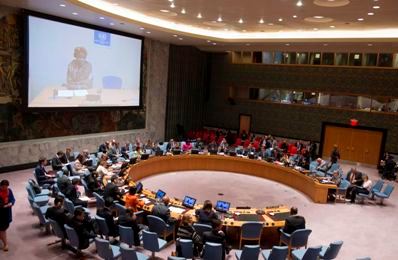UN Security Council tells parties to abide by IGAD position on 28 states
March 18, 2016 (JUBA) – The United Nations Security Council (UNSC) has outlined steps to be taken by South Sudanese parties to the peace agreement signed 5 months ago and called on the government of President Salva Kiir to stop operationalization of the unilaterally created 28 new states in the country.

“The parties to the agreement abide by and take no action inconsistent with the Intergovernmental Authority on Development (IGAD) 30-31 January 2016 communiqué, which was subsequently endorsed by the parties and JMEC, on the issue of the Presidential Decree on the creation of 28 new states,” partly reads the statement.
The UNSC’s presidential statement urged the government of President Kiir and the SPLM in opposition of First Vice President designate, Riek Machar, to “fully and immediately adhere to the permanent ceasefire.”
The world body also asked the parties to cooperate with the Joint Monitoring and Evaluation Commission (JMEC) and implement the security arrangement for Juba to facilitate the formation of transitional government of national unity.
It also urged the parties to soon form a transitional government, adding that it will review progress by the end of March.
“The President, the First Vice-President, and Vice-President, as set out in the Agreement, take up their positions in the Transitional Government of National Unity (TGNU) in Juba,” reads the statement extended to Sudan Tribune on Friday.
It called on the government of South Sudan and the SPLM-IO to protect civilians and civilian facilities, including schools and hospitals and allow people to move freely in accordance with relevant provisions of international law and UN guiding principles of humanitarian assistance, including the full, safe, and unhindered humanitarian access to help ensure timely delivery of humanitarian assistance to all those in need.
The statement accused the South Sudanese army of taking part in the Malakal attack on civilians inside the UN compound, warning this could amount to war crimes.
“The Security Council expresses particular alarm at credible reports of armed men in Sudan People’s Liberation Army (SPLA) uniforms entering the United Nations Mission in the Republic of South Sudan (UNMISS) protection of civilians site and firing on civilians,” it said.
“The Security Council stresses that attacks against civilians, UNMISS personnel, as well as United Nations premises are unacceptable and may constitute war crimes.”
The Council warned the parties that attacking on UN bases, like that on Protection of Civilians sites in Malakal last month, may constitute war crime.
It called upon the government of South Sudan to investigate and prosecute those responsible for the attack and commended the United Nations for quickly announcing establishment of a High-Level Board of Inquiry to be convened by the United Nations Department of Peacekeeping Operations and Department of Field Support which will conduct an in-depth investigation into UNMISS’ response to this incident.
The Security Council also underscored its grave concern at the deteriorating economic and humanitarian situation in South Sudan, with an estimated 2.8 million people who are severely food insecure and that humanitarian access continues to be restricted.
President Kiir and opposition leader Machar signed the Agreement to Resolve the Conflict in South Sudan in August 2015, but formation of transitional government has been delayed due to failure to demilitarize the capital, Juba, and transportation of SPLM-IO forces to Juba.
Machar, who was appointed by President Kiir last month as his deputy again said he would only return to Juba after his forces landed in the capital.
The Troika (U.S, Norway and Britain) as well as European Union has pledged to transport the opposition forces to Juba. It is not yet clear when that will happen.
The UN Security Council in its statement however commended the peace parties for taking some steps including selection of ministerial portfolios, among others, but added it will review progress on 31 March.
(ST)
